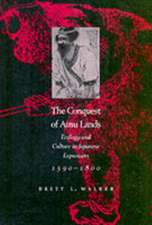A Path Toward Gender Equality: State Feminism in Japan: East Asia: History, Politics, Sociology and Culture
Autor Yoshie Kobayashien Limba Engleză Paperback – 27 iul 2012
| Toate formatele și edițiile | Preț | Express |
|---|---|---|
| Paperback (1) | 443.69 lei 6-8 săpt. | |
| Taylor & Francis – 27 iul 2012 | 443.69 lei 6-8 săpt. | |
| Hardback (1) | 1005.04 lei 6-8 săpt. | |
| Taylor & Francis – 23 apr 2004 | 1005.04 lei 6-8 săpt. |
Din seria East Asia: History, Politics, Sociology and Culture
-
 Preț: 449.25 lei
Preț: 449.25 lei -
 Preț: 449.41 lei
Preț: 449.41 lei -
 Preț: 213.58 lei
Preț: 213.58 lei -
 Preț: 426.94 lei
Preț: 426.94 lei -
 Preț: 436.14 lei
Preț: 436.14 lei -
 Preț: 485.99 lei
Preț: 485.99 lei -
 Preț: 482.17 lei
Preț: 482.17 lei -
 Preț: 481.20 lei
Preț: 481.20 lei -
 Preț: 493.12 lei
Preț: 493.12 lei -
 Preț: 490.83 lei
Preț: 490.83 lei -
 Preț: 382.95 lei
Preț: 382.95 lei -
 Preț: 347.64 lei
Preț: 347.64 lei - 18%
 Preț: 276.29 lei
Preț: 276.29 lei -
 Preț: 430.43 lei
Preț: 430.43 lei - 14%
 Preț: 300.29 lei
Preț: 300.29 lei -
 Preț: 449.41 lei
Preț: 449.41 lei -
 Preț: 436.14 lei
Preț: 436.14 lei -
 Preț: 426.51 lei
Preț: 426.51 lei -
 Preț: 382.05 lei
Preț: 382.05 lei -
 Preț: 427.50 lei
Preț: 427.50 lei -
 Preț: 449.41 lei
Preț: 449.41 lei -
 Preț: 449.41 lei
Preț: 449.41 lei -
 Preț: 255.66 lei
Preț: 255.66 lei - 16%
 Preț: 311.51 lei
Preț: 311.51 lei -
 Preț: 432.12 lei
Preț: 432.12 lei - 18%
 Preț: 1167.01 lei
Preț: 1167.01 lei - 18%
 Preț: 1171.19 lei
Preț: 1171.19 lei -
 Preț: 436.14 lei
Preț: 436.14 lei - 18%
 Preț: 1001.84 lei
Preț: 1001.84 lei -
 Preț: 363.59 lei
Preț: 363.59 lei - 30%
 Preț: 768.30 lei
Preț: 768.30 lei
Preț: 443.69 lei
Nou
Puncte Express: 666
Preț estimativ în valută:
84.91€ • 92.20$ • 71.32£
84.91€ • 92.20$ • 71.32£
Carte tipărită la comandă
Livrare economică 22 aprilie-06 mai
Preluare comenzi: 021 569.72.76
Specificații
ISBN-13: 9780415650731
ISBN-10: 0415650739
Pagini: 232
Ilustrații: 7
Dimensiuni: 152 x 229 x 12 mm
Greutate: 0.32 kg
Ediția:1
Editura: Taylor & Francis
Colecția Routledge
Seria East Asia: History, Politics, Sociology and Culture
Locul publicării:Oxford, United Kingdom
ISBN-10: 0415650739
Pagini: 232
Ilustrații: 7
Dimensiuni: 152 x 229 x 12 mm
Greutate: 0.32 kg
Ediția:1
Editura: Taylor & Francis
Colecția Routledge
Seria East Asia: History, Politics, Sociology and Culture
Locul publicării:Oxford, United Kingdom
Cuprins
1. Introduction 2. Establishment of a Women's Bureau in Japan 3. Ineffective Activity Prior to the International Women's Year 4. Depature from Politics of Protection: Agenda Setting Process 5. Mediator's Role of the Women's Bureau: Activities in the Decision Making for the 1986 EEOL 6. Activity of the Women's Bureau for Amendment of the EEOL 7. Conclusion
Descriere
The first study of state feminism in a non-western nation state, this volume focuses on the activities and roles of the Women's Bureau of the Ministry of Labor in post-World War II Japan. While state feminism theory possesses a strong capability to examine state-society relationships in terms of feminist policymaking, it tends to neglect a state's activity in improving women's status and rights in non-western nations where the feminist movements are apathetic or antagonistic to the state and where the state also creates a vertical relationship with feminist groups.














